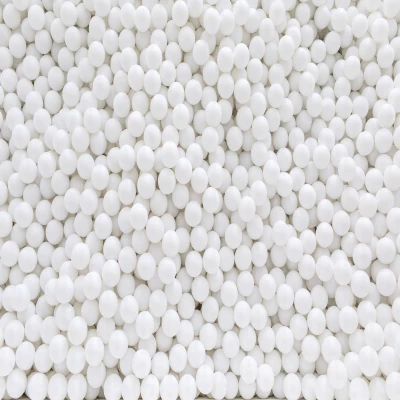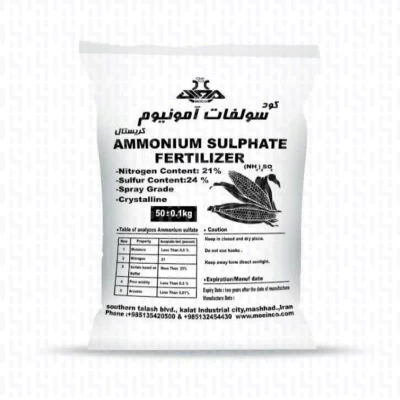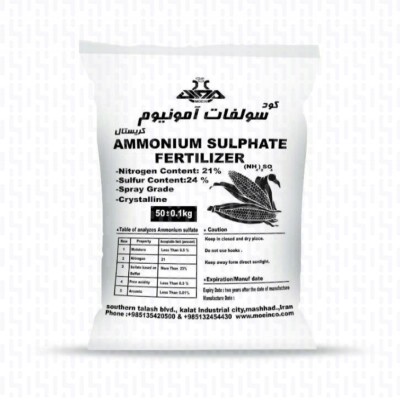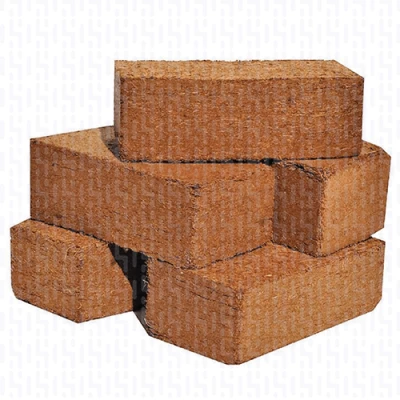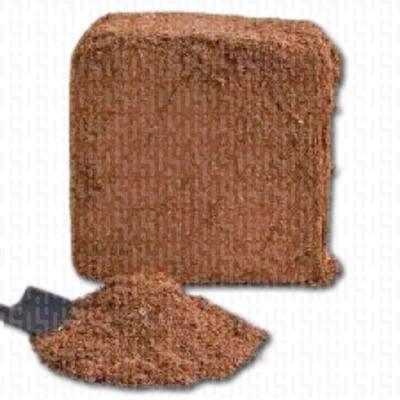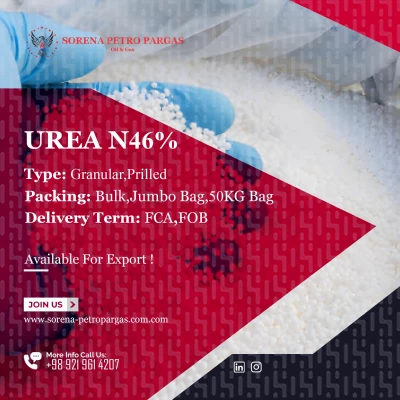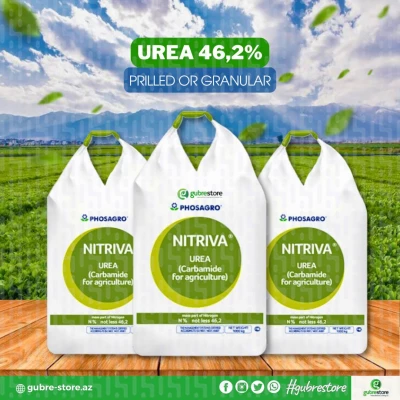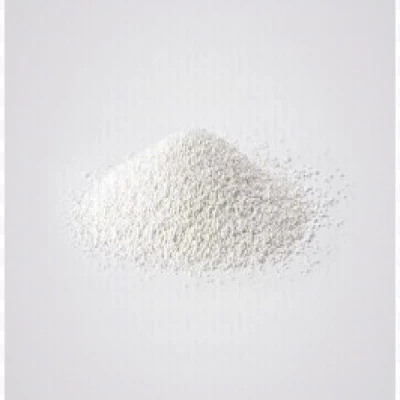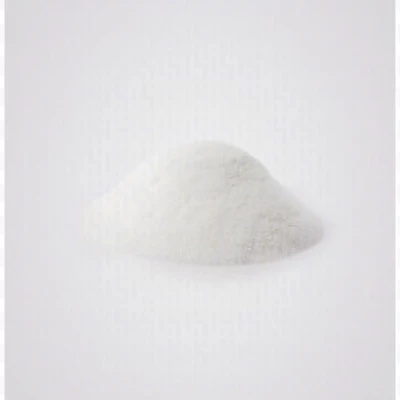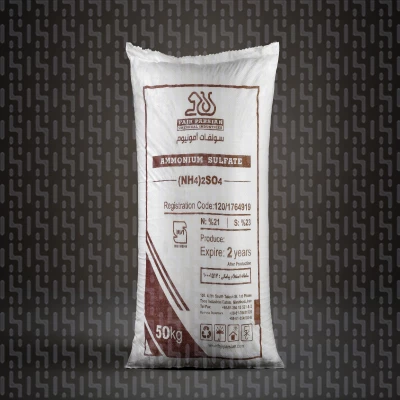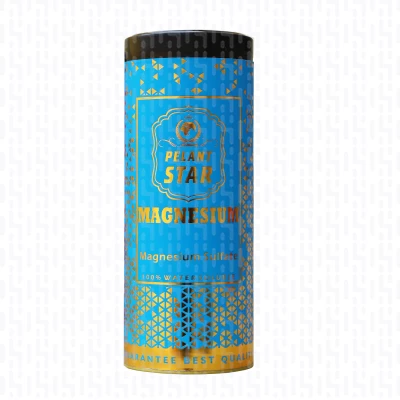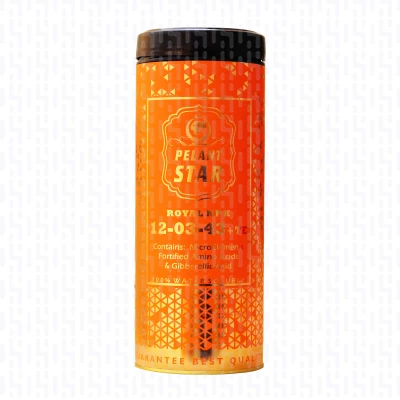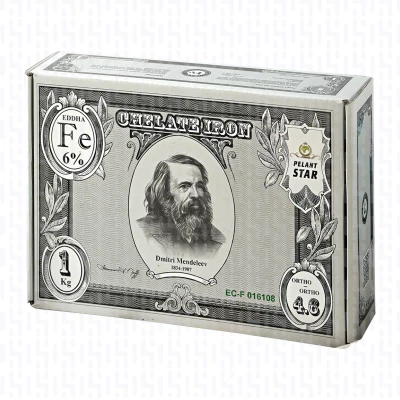Fertilizer and its role in agriculture
Fertilizers are nutrients that are added to soil and plants to increase their growth and yield.
In agriculture, fertilizers are used to compensate for the lack of minerals and nutrients in the soil and are used as supplementary nutrition for plants.
In other words, the fundamental role of fertilizers in agriculture has led to their many benefits for soil and plants. The main benefits of fertilizers for agriculture include the following.
Providing essential nutrients for plants
Fertilizers provide essential elements such as nitrogen, phosphorus, and potassium (macro elements) as well as trace elements such as iron, zinc, copper, and manganese (microelements) that are necessary for healthy and optimal plant growth.
These elements contribute to better plant structure and performance and play a fundamental role in the production of chlorophyll, photosynthesis, and plant metabolism.
Increasing productivity and quality of products
Using appropriate fertilizers increases crop production and improves their quality.
For example, nitrogen fertilizers promote faster growth and increase the volume of foliage, while potassium fertilizers help improve the taste, color, and firmness of fruits and vegetables.
This allows producers to market higher-quality products in the field of agricultural fertilizer sales.
Improving soil structure and increasing organic matter
In addition to providing nutrients, organic and biofertilizers, such as compost and manure, also provide soil organic matter.
Organic matter helps improve soil structure, increase water retention capacity, and improve soil aeration.
Over time, regular use of organic fertilizers increases soil organic matter, thereby strengthening beneficial soil microorganisms.
Increase plant resistance to diseases and adverse conditions
Fertilizers, especially fertilizers containing potassium, help plants to be more resistant to diseases, pests, and adverse weather conditions such as drought and cold.
Potassium helps regulate the osmotic pressure in plant cells and increases cell strength, which makes the plant more resistant to environmental stresses.
Soil pH adjustment
Fertilizers can help regulate soil PH. Some fertilizers, such as lime fertilizers, can reduce soil acidity, making it more suitable for plants that require a neutral or slightly alkaline PH.
Adjusting soil pH helps improve the absorption of nutrients by plant roots, leading to better plant growth.
Reduce erosion and maintain soil fertility
The use of fertilizers, especially organic fertilizers, helps maintain and improve soil quality.
These fertilizers stabilize nutrients in the soil and prevent soil erosion by increasing the activity of soil microorganisms.
Organic fertilizers also help improve soil compaction and protect the soil from erosion by wind and rain.
Reducing production costs in the long term
Although the cost of purchasing fertilizer may be high at first, over time, increasing productivity and producing higher quality products reduces production costs.
In particular, by using organic and biological fertilizers that help maintain and improve soil quality, the costs associated with depleted and low-yielding soil can be avoided in the long term.
Increasing plant growth rate
Nitrogen fertilizers have a direct impact on the growth rate of plants because nitrogen is one of the main components of proteins and chlorophyll, which plays a vital role in photosynthesis.
Using nitrogen fertilizers at the right times causes faster growth and better formation of leaves and branches, and significantly increases plant growth.
Maintaining and enhancing soil biodiversity
Organic and biological fertilizers can help maintain and enhance soil biodiversity.
These fertilizers increase the population of beneficial soil microorganisms that play a role in the decomposition of organic matter and the cycling of nutrients.
This strengthens the soil ecosystem and provides a healthier environment for plants to grow.
Reduce dependence on pesticides and chemical toxins
Fertilizers that increase plant resistance to diseases and pests can reduce the need for pesticides and chemical toxins.
Potassium and calcium fertilizers in particular can reduce plant vulnerability to pathogens and save farmers from excessive use of pesticides. This reduces costs and improves the health of the final product.
Top 10 Suppliers of Chemical and Agricultural Fertilizers in Iran
In Iran, many companies are active in producing or supplying agricultural and chemical fertilizers. The table below shows some of the top suppliers of agricultural fertilizers.
| 1 | Kimia Pars shayankar |
| 2 | Ayesh sabz gostar khazar |
| 3 | Shimico |
| 4 | Atlas Plantation of Sepahan |
| 5 | GolbaraneSabz |
| 6 | Zaeem |
| 7 | Parham Shimi |
| 8 | Lordegan urea fertilizer company |
| 9 | Agricultural Support Services Co |
| 10 | Aria shimi |
Introduction and Types of Agricultural Fertilizers
In general, agricultural fertilizers are divided into three main categories: chemical, organic, and biological fertilizers, which we will discuss below.
Chemical Fertilizers
This category of fertilizers, which is made from minerals and chemical compounds, usually has a high concentration of nutrients and is more quickly available to plants.
However, excessive use of chemical fertilizers may harm the soil and the environment.
These fertilizers are generally classified into three main categories: nitrogen or nitrogen - containing fertilizers, phosphorus fertilizers, and potassium fertilizers (potassium and potassium fertilizers).
NPK agricultural fertilizer is an of a chemical fertilizer that contains the three main ingredients nitrogen, phosphorus, and potassium for plant growth.
From the NPK fertilizer category, 202020 fertilizer, as a complete fertilizer, contains an equal amount of each of the aforementioned elements.
Urea Fertilizer
Urea fertilizer nitrogen fertilizers that usually contain and are known by this name because of their white color or high purity.
The most important nitrogen fertilizers include urea, ammonium nitrate, and ammonium sulfate.
These fertilizers are effective in increasing plant growth and foliage production, improving crop yield, and amending alkaline soils.
Di Ammonium Phosphate Fertilizer (DAP)
Di Ammonium Phosphate fertilizer one of fertilizers that contain phosphorus and organic matter and are known by this name because of their dark, grayish - brown color.
These fertilizers usually help improve soil structure, root development, and overall plant performance.
Simple and triple superphosphate, diammonium phosphate, and humic organic fertilizers are examples of phosphate chemical fertilizers.
Organic fertilizers
This group of fertilizers is known as organic fertilizers; Because they are derived from natural and organic materials and include naturally biodegradable materials such as plant residues, animal waste, compost, and other natural materials.
These fertilizers gradually add nutrients to the soil and improve soil structure and microbial activity.
Types of organic fertilizers that fall into the organic agricultural fertilizer category include livestock manure (animal manure, poultry manure, and fish manure), compost manure (seaweed fertilizer), and vermicompost fertilizer.
Biological fertilizers
Biological or biological fertilizers include microbial organisms that can directly or indirectly provide nutrients to plants.
These fertilizers are composed of microorganisms such as bacteria, fungi, and algae that play a role in biological processes such as nitrogen fixation, phosphate solubilization, and plant growth stimulation.
Macroelement and Microelement Fertilizers
Microelement and macroelement fertilizers are categories of chemical and nutrient elements that refer to the small and large amounts needed by plants, respectively.
Both groups of these elements are essential for plant growth, development, and performance, and each plays a specific role in plant biological processes.
As examples of this category, flowering fertilizer and root fertilizer provide essential elements to promote better growth and increase the quality of agricultural products.
Also, improving soil structure, increasing crop production, and plant resistance to diseases and pests are other benefits of these fertilizers.
Among the differences between these two fertilizers, which are used as agricultural fertilizers, we can mention the greater need of plants for macroelement fertilizers than for microelements.
Therefore, a deficiency of macroelements affects the growth and size of the plant; While microelement deficiencies affect the color, appearance, and quality of the product more.
As a result, it can be said that the presence of these two types of fertilizers as complete chemical fertilizers can have a significant impact on the field of agriculture.
Macroelement fertilizers
Macronutrient fertilizers or basic element fertilizers include elements that plants need in larger quantities and are essential for initial growth and crop production.
The most important macronutrients in fertilizers include nitrogen, phosphorus, and potassium, which, for example, account for 46% of agricultural urea fertilizer.
Also, elements such as calcium, magnesium, and sulfur are also considered macronutrients in some categories.
• Nitrogen:
Nitrogen plays a role in the production of proteins, enzymes, and chlorophyll and causes normal plant growth and an increase in the volume of foliage.
Nitrogen deficiency usually causes yellowing of leaves and reduced plant growth.
• Phosphorus:
Phosphorus is very important in energy production and its transfer in the plant. This element plays a role in root development, flowering, and fruit formation.
Phosphorus deficiency causes slow growth, weak roots, and reduced crop production.
• Potassium:
Potassium increases the plant's resistance to diseases and adverse conditions and helps regulate water in plant cells like potassium sulfate.
This element improves crop quality, increases fruit size, and strengthens the plant's immune system.
• Calcium:
Calcium helps strengthen cell walls and is effective in cell division and soil pH regulation. Calcium deficiency causes plant tissues to weaken and reduces fruit strength.
• Magnesium:
Magnesium is the main component of the chlorophyll molecule and plays a role in the photosynthesis process.
Magnesium deficiency causes yellowing of the lower leaves and reduced chlorophyll production.
• Sulfur:
Sulfur is involved in the production of proteins and some enzymes. Sulfur deficiency causes yellowing of the leaves and reduces the quality and quantity of crops.
Microelement fertilizers
Microelement fertilizers or trace element fertilizers contain elements that plants need in very small amounts, but this small amount is vital for plant growth and health.
Microelements include iron, zinc, manganese, copper, molybdenum, boron and chlorine.
• Iron:
Iron plays a vital role in the production of chlorophyll and photosynthesis.
This element is essential for electron transport in plants. Iron deficiency in iron fertilizer usually causes yellowing of leaves in plants.
• Zinc:
Zinc plays a role in regulating plant growth, the production of plant hormones, and the development of roots.
Zinc deficiency can cause plant shortening, leaf deformation, and reduced flowering.
• Manganese:
Manganese plays a role in the activation of enzymes and photosynthesis. Manganese deficiency causes yellowing of leaves and reduced plant growth.
• Copper:
Copper plays a role in the production of proteins and the construction of cell walls.
Copper deficiency causes weakening of plant tissues and reduced flowering and fruiting.
• Molybdenum:
Molybdenum plays a role in nitrogen fixation and the production of plant enzymes. Molybdenum deficiency leads to yellowing of leaves and reduced growth.
• Boron:
Boron is essential for cell division and sugar transport in plants. Boron deficiency causes impaired root growth, leaf deformation, and reduced crop quality.
• Chlorine:
Chlorine plays a role in photosynthetic processes and regulating plant osmotic pressure.
This element is required in very small amounts and is usually sufficiently available to the plant under natural conditions.
Liquid or foliar fertilizers
Liquid or foliar fertilizers are used to spray on the leaves and are quickly absorbed by the plant. These fertilizers are very effective for seasonal use and rapid supply of nutrients.
Liquid agricultural fertilizers can contain macro and micro elements and are selected and used according to the needs of the plant.
Liquid fertilizers can be divided into two main categories, soil-based liquid fertilizers and foliar spray liquid fertilizers, depending on the type and application.
The advantages of liquid and foliar fertilizers include high absorption speed, precise nutrition control, use in irrigation systems, the possibility of foliar application, and rapid compensation for element deficiencies.
Fertilizer Applications
The applications of fertilizers include providing essential nutrients for plant growth, improving quality and increasing crop yield, strengthening soil structure and microbial activity, increasing plant resistance to adverse environmental conditions, compensating for nutrient deficiencies in plants, assisting biological and physiological processes in plants, assisting specific crops at specific times, and reducing negative impacts on the environment.
Guide to Buying the Right Fertilizer
To buy the right fertilizer, it is necessary to pay attention to several factors, including identifying the soil for the need for agricultural pesticides and fertilizers, selecting the type of fertilizer, considering macroelements and microelements, selecting fertilizer based on the method of application, and checking the quality and reputation of the manufacturer's brand.
In addition to these, studying the product label and available instructions, paying attention to environmental and safety factors, considering the fertilizer sales license, calculating costs and budget, choosing the right time to purchase and use fertilizer, and paying attention to fertilizer storage and transportation considerations are among the important factors in purchasing fertilizer. For more information, you can contact Shimico experts.
Packaging and Storage
Packaging, storage, and accurate injection of fertilizers using an agricultural fertilizer injection pump is of great importance because inappropriate conditions can lead to reduced quality, changes in chemical properties, and even environmental hazards.
To maintain the quality and safety of fertilizer, special attention should be paid to standard packaging and storage methods.
Depending on their type, fertilizer packaging is divided into two main categories:
solid fertilizer packaging and liquid fertilizer packaging, to protect the fertilizer from external factors such as moisture, light, and temperature.
On the other hand, proper packaging helps protect the fertilizer from damage and quality loss during storage and transportation.
Loading and Delivery
Due to their specific chemical and physical properties, loading and delivery of fertilizers requires compliance with principles and standards to ensure the quality of the fertilizers and prevent potential risks.
When loading and delivering fertilizers, attention should be paid to issues such as preparation for loading fertilizers, loading equipment and methods, safety tips in loading and transporting fertilizers, environmental pollution, how to transport fertilizers, delivering fertilizers and unloading at the destination, registration and documentation, laws and standards.
Competitive price of agricultural and chemical fertilizers
Fertilizers available on the market include Iranian fertilizers and fertilizers from countries around the world, such as Turkish fertilizers and Afghan fertilizers.
Therefore, the price of agricultural and chemical fertilizers, from the price of sheep manure to the price of urea fertilizer, which is one of the most widely used chemical fertilizers, is one of the important concerns of farmers and suppliers.
Understanding the factors affecting the price of fertilizers and how competitive they are in this market can help farmers and consumers make better choices in purchasing agricultural fertilizers.
You can contact Shimico experts to purchase and register foreign and Iranian agricultural fertilizers with the best quality and most reasonable price.













